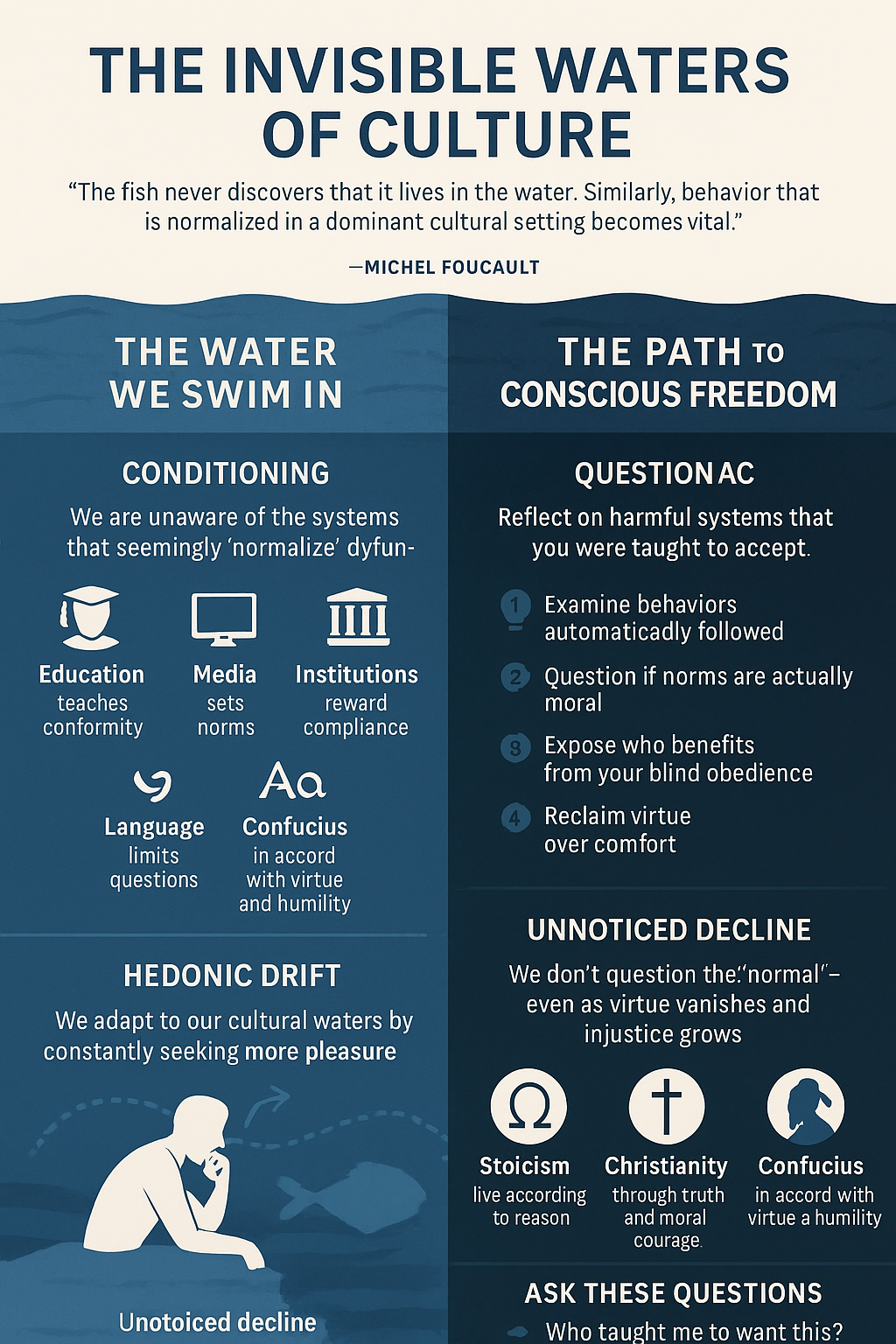Introduction: Culture as the Water We Swim In
Michel Foucault once observed, “The fish never discovers that it lives in the water… Similarly, behavior that is normalized in a dominant cultural setting becomes invisible.” This metaphor offers a chilling insight: we are often unaware of the very systems and assumptions that govern our lives. These “waters” are our cultural norms, values, and institutions—so pervasive that they seem natural, unquestionable, and unchangeable.
Pair this with the psychological concept of the hedonic treadmill—the tendency of humans to quickly adapt to new levels of comfort, pleasure, or stimulation—and we begin to understand why many remain blind to the decline of virtue, freedom, and meaning in modern life.
I. The Cultural “Water”: What Foucault Warned Us About
Foucault believed that society trains individuals through invisible power structures:
- Education normalizes obedience and conformity.
- Media sets the boundaries of acceptable thought.
- Institutions reward compliance, not integrity.
- Language limits what can even be questioned.
As these patterns are absorbed, individuals cease to see them as choices and accept them as reality.
“We must cease once and for all to describe the effects of power in negative terms: it ‘excludes’, it ‘represses’… In fact, power produces reality; it produces domains of objects and rituals of truth.” — Michel Foucault
The danger? If your cultural “water” is toxic—filled with consumerism, narcissism, pride, apathy, and injustice—you won’t even notice. You’ll call it “normal.”
II. The Hedonic Treadmill: The Psychological Trap
The hedonic treadmill explains how:
- We adjust to higher levels of pleasure or comfort.
- After adaptation, those levels no longer satisfy us.
- We chase more—money, pleasure, status—believing that “just a bit more” will make us happy.
But this adaptation masks the hollowness of our pursuits. It becomes a cycle of insatiable consumption, all while numbing our awareness of deeper purpose or moral erosion.
In a decaying culture, we adapt to:
- Noise and distraction as normal.
- Shallow relationships as unavoidable.
- Injustice as politics.
- Emptiness as success.
III. Cultural Conditioning + Hedonic Drift = Blind Decay
When Foucault’s “invisible normalization” meets the hedonic treadmill, a sinister dynamic emerges:
- We normalize dysfunction – corrupt leaders, broken families, moral relativism.
- We adapt to it emotionally – we don’t even feel disturbed anymore.
- We defend it socially – anyone who questions the norm is shamed or silenced.
- We become addicted to the system – even if it hurts us, it’s all we know.
This is why, in societies transitioning from freedom to bondage (as in the Tytler Cycle), citizens often feel no sense of alarm. The slow erosion is normalized. Comfort replaces conscience. Progress is defined by pleasure, not virtue.
“People do not resist change. They resist being changed.”
IV. Waking Up: How to See the Water
Escaping the invisible grip of cultural conditioning requires what Foucault called “problematization”—the art of seeing what you never questioned.
Steps to awakening:
- Reflect on your automatic behaviors and desires: Who taught you to want what you want?
- Question the “normal”: Is this truly healthy? Just? True?
- Expose the system: Who benefits from your obedience, distraction, or silence?
- Reclaim virtue over comfort: The good life is not the easy life—it is the examined one.
V. Faith, Philosophy, and Freedom: Rediscovering Higher Laws
The only way out is above—by appealing to higher principles that do not change with trends.
- Stoicism calls for living according to nature and reason.
- Christianity teaches freedom through truth and moral courage.
- Confucius emphasizes harmony through virtue and humility.
These traditions help us transcend the water, not swim blindly in it.
“Do not conform to the pattern of this world, but be transformed by the renewing of your mind.” – Romans 12:2
Conclusion: See the Water, Change the Life
To live in our culture without reflection is to be a fish in poisoned waters—numb, distracted, dying slowly.
But to see the water is the first step to changing your course. As Foucault implied, freedom begins when you realize that what is “normal” may be the very thing that’s destroying you.
The question is not: Am I swimming in the water?
The question is: Whose water am I in—and what is it doing to me?






